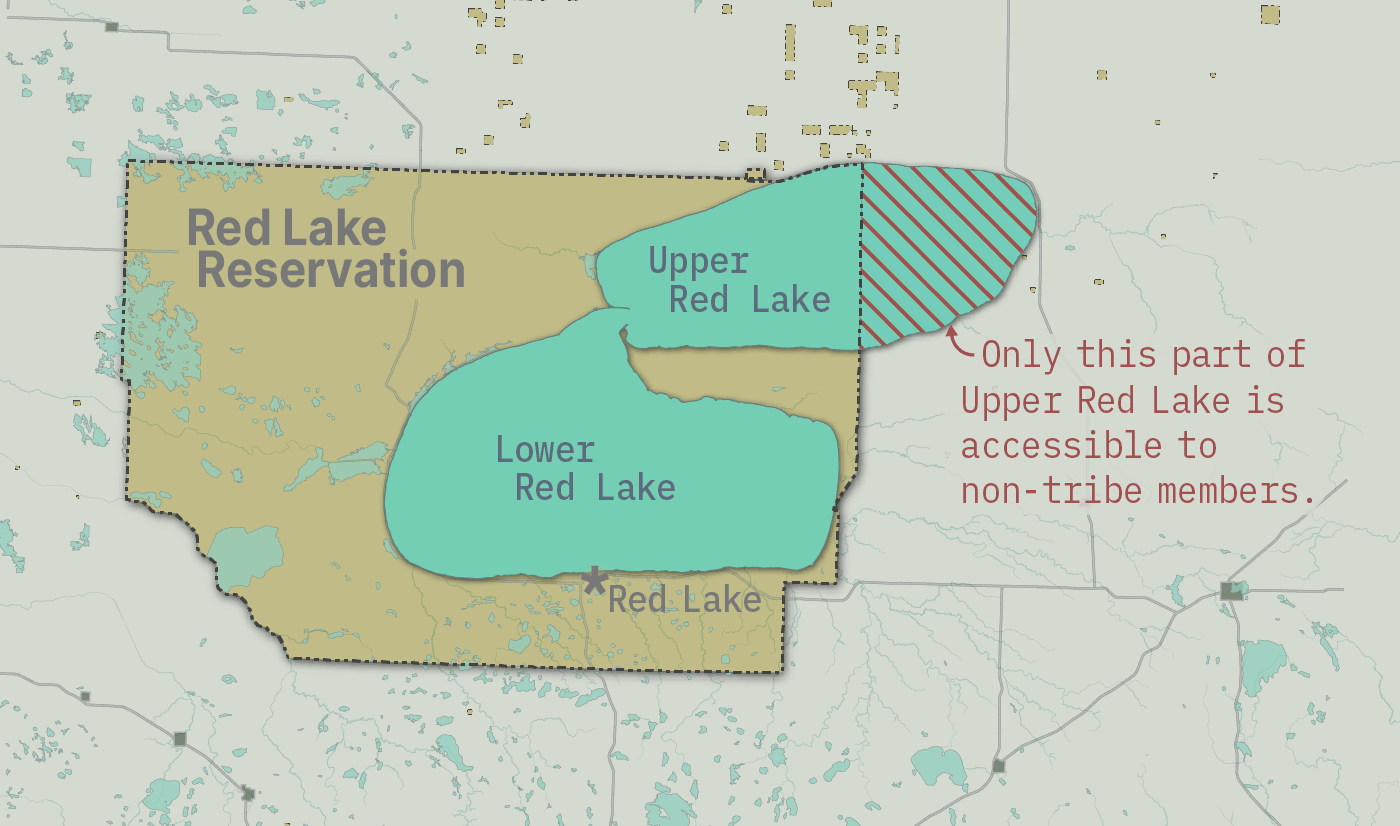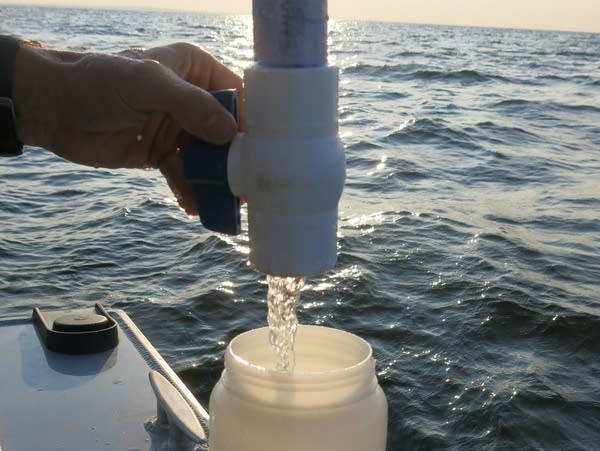Red Lake Nation confronts a new invader: Zebra mussels

Go Deeper.
Create an account or log in to save stories.
Like this?
Thanks for liking this story! We have added it to a list of your favorite stories.
Surrounded by Red Lake Nation and open only to tribal members, Lower Red Lake has stayed largely insulated from the world — the only big walleye lake left in Minnesota still free of invasive species.

That’s why the discovery of zebra mussel larvae earlier this year in Upper Red Lake put tribal scientists and reservation leaders into crisis mode. The destructive creatures are on the reservation’s doorstep. The worry is they’ll spread quickly to Lower Red Lake, threatening the reservation’s economic and spiritual core.
It’s a reality that’s left some Red Lakers frustrated and angry that they are about to pay for what they see as the poor environmental vigilance of Minnesotans outside the reservation’s borders, not cleaning boats and letting the pests spread to waterways across the state.
They’re looking for answers, but there is no solution for a lake so huge.
Turn Up Your Support
MPR News helps you turn down the noise and build shared understanding. Turn up your support for this public resource and keep trusted journalism accessible to all.
“The tribe trusts us to care for their lake,” said Shane Bowe, the tribe’s water resources director, as he and tribal biologist Tyler Orgon boated across the widest part of the lake earlier this summer, collecting water samples. “We take that very seriously. I wish there was more we could do.”

There’s some debate over just how much zebra mussels might affect Red Lake. Different water bodies react in different ways, and specific outcomes are hard to predict.
Whatever happens, it will not be good. Zebra mussels can crowd out native mussels and filter out massive amounts of algae — the food that drives the walleye fishery.
“A lake can only support so much biomass,” Bowe said. “If the zebra mussels start at the bottom of the food chain and replace a million pounds of biomass with themselves, that’s our whole walleye harvest.”
‘We all feel the pain’
Zebra mussels have infested hundreds of Minnesota lakes and rivers in the 20 years since they first turned up in Duluth harbor in the ballast waters of an oceangoing ship. With their razor-sharp edges and ability to crowd out native species, they’re equal parts nuisance and pernicious force.
But the damage they could deliver to Lower Red Lake could be especially bad.
Lower Red is the largest body of water in Minnesota and the most prolific walleye fishery in the state — producing 1 million pounds of walleye every year.

Tribal elders believe it’s sacred. Only tribal members are allowed to fish it, which is why it has stayed so pristine. Researchers use it as a control group to understand how infestations of zebra mussels and spiny water flea hurt other fisheries.
While completely contained within the reservation, it’s connected by a mile-wide strip of water to Upper Red Lake, which the tribe only partially controls. The treaty that created the Red Lake Reservation was supposed to give the tribe all of Upper Red, but a little less than half of the lake was never turned over.
Now, the east side of Upper Red is lined with cabins and resorts, owned by people who are not part of the tribe. Based on where the young zebra mussels were found, it was most likely one of those white anglers who brought them to the lake.

Tribal secretary Sam Strong is still furious at the discovery. Zebra mussels could put 500 fishery jobs at risk, but the anguish lies deeper.
“This is our storehouse,” he said. “It’s woven into our way of life. The lake is like one of our relatives. It’s hard to watch your brother or sister or mother getting poisoned. That’s how I see it. That’s how a lot of us see it. When the lake comes under attack we all feel the pain.”
Strong blames the fishery managers in charge of Upper Red Lake. He says there weren’t enough invasive species inspectors to keep boats from bringing in the zebra mussels.
“It’s just the same story we’ve heard for centuries,” Strong said. “The neglect of our resources.”
‘How am I supposed to battle that?’
The fates of Upper Red and Lower Red lakes are connected, Strong said. The tribe has put a huge amount of work into keeping their lake clean, and he believes the state didn’t match the tribe’s effort.
On paper, that’s true. There are three public boat launches on Upper Red Lake. Only two are ever staffed by boat inspectors, and only for a few days a week during the busiest time of the year.
Fewer than 1 in 10 boats entering the lake are inspected for invasive species.

The state pays out $10 million a year to counties to build their own boat inspection programs. In Beltrami County, Minn., which includes the nontribal part of Upper Red, there are 19 inspectors divided among 49 public boat launches.
“It would be impossible for us to do what the tribe does,” said Bruce Anspach, who runs Beltrami County’s boat inspection program.
Anspach said he sends as many inspectors as he can to Upper Red — and any more would leave other lakes totally unprotected. He doesn’t have enough money or people to watch every lake all the time.

Neither does the tribe. The reason Lower Red Lake is so healthy, he said, isn’t because of any massive boat inspection program. It’s because of tribal values.
“The tribe sees their lake as a relative,” Anspach said. “So do I, but I’m working with a lot of different people groups. Sometimes I run into anglers who think invasive species are inevitable. And they see my inspections as a violation of their freedoms. How am I supposed to battle that?”
Testing, and waiting

When zebra mussels were first confirmed in Upper Red, the Minnesota DNR announced that they’d be working with the tribal DNR to find a solution. It turns out, there aren’t any solutions to be had.
Fisheries managers have had some success killing zebra mussels with copper sulfate treatments, but everyone agrees that wouldn’t work on Red Lake.
Copper dioxide only works in small ponds or shallow bays.
Upper Red alone is almost 200 square miles — more than three times the size of Minneapolis. There’d be no way to pinpoint the treatments.
The Minnesota DNR also announced that they’d increase watercraft inspections on Upper Red, which Anspach said they’ve done, slightly. The county bought a line of TV and local radio ads to educate anglers on the prevention of invasive species.
For now, however, there isn’t much more to do but collect data and wait.

On a calm, sunny morning, as Bowe navigated the Red Lake DNR boat, the lake was totally empty — a strange sight in a state obsessed with walleye. If it were any other lake, the water would be swarming with anglers.
Bowe stopped the boat every few miles to take water samples. He and Orgon checked for clarity, pH levels and a whole subset of temperature, chlorophyll and phosphorous data.
Though they work for the Red Lake DNR, a tribal entity, their samples are sent to the state for analysis.
Orgon collected zooplankton in a big cone of filtration cloth resembling a windsock. It’s these plankton samples that are important right now. If zebra mussels spread to Lower Red Lake, this is where they’ll show up.




